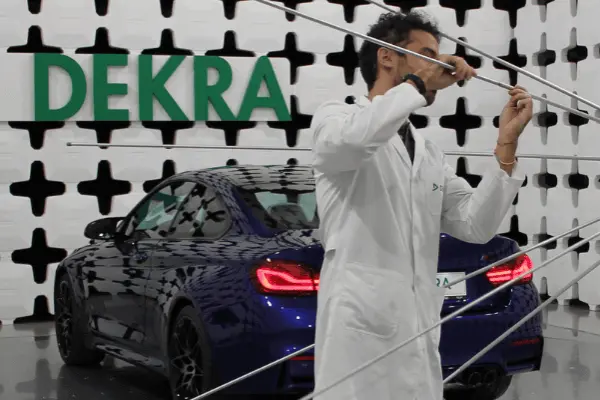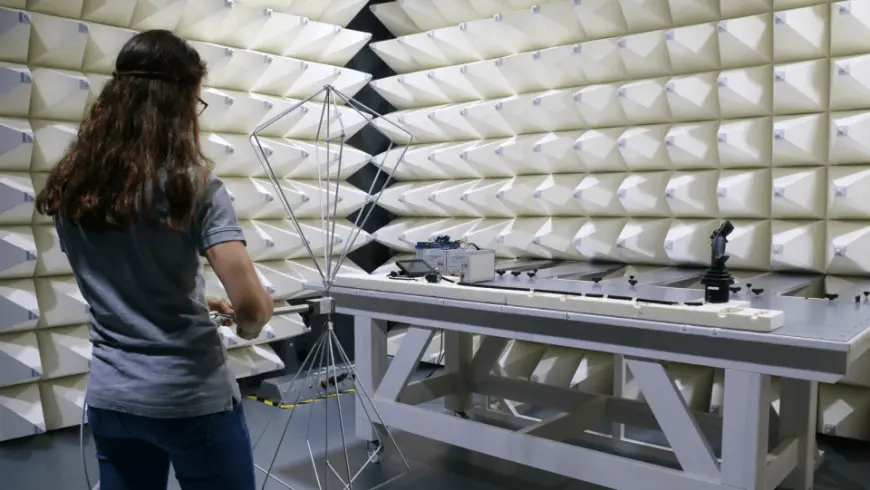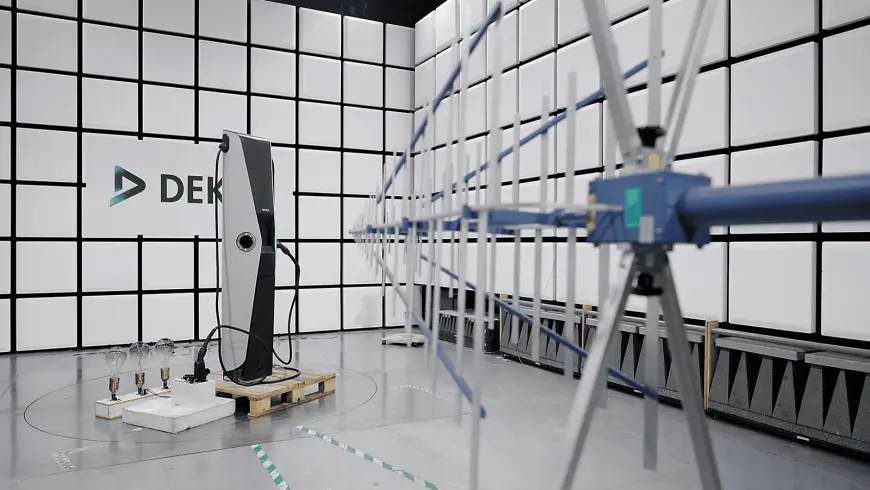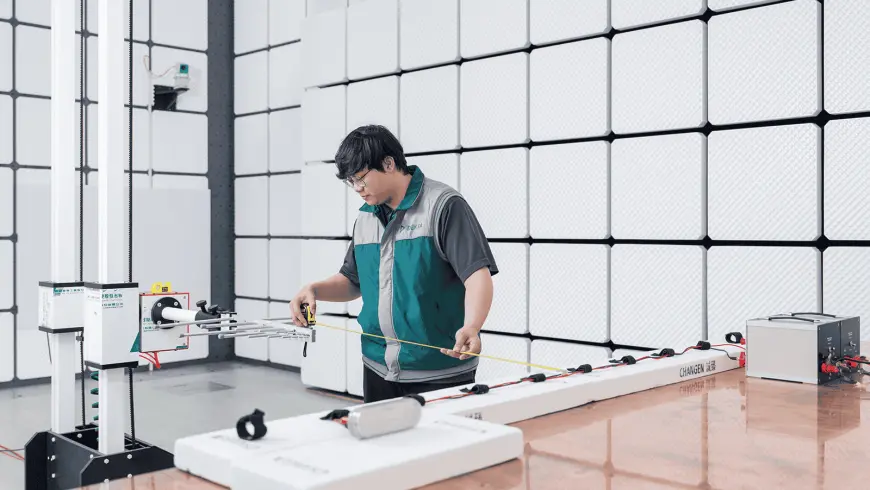
Automotive EMC Testing
Ensuring Electromagnetic Compatibility for Automotive Components and Systems

Automotive EMC Testing
Ensuring Electromagnetic Compatibility for Automotive Components and Systems
Automotive EMC Testing
Modern vehicles integrate numerous electronic components that must operate reliably without causing interference with one another or with external systems. With the rapid growth of Electric Vehicles (EVs), Advanced Driver Assistance Systems (ADAS), and connected car technologies, ensuring electromagnetic compatibility (EMC) has become even a more critical factor for safety, performance and regulatory compliance in the automotive industry.
DEKRA’s Automotive EMC Testing services ensure that automotive components, systems, and complete vehicles comply with international standards such as CISPR 25, UN-ECE Regulation No. 10, ISO 7637, ISO 11452, etc., as well as OEM specifications like GM, Ford, Stellantis, BMW, Daimler, Volkswagen, HKMC, Toyota, Madza and more.
About Automotive EMC Testing
Automotive EMC testing evaluates both electromagnetic emissions and immunity characteristics of automotive components and systems. This includes conventional automotive electronics and emerging technologies such as high-voltage electric systems (on-board charger, inverter, etc.) or advanced connectivity devices.
DEKRA’s accredited EMC specialists use advanced test facilities to recreate the full spectrum of electromagnetic conditions found in real vehicles. From transient disturbances to broadband and narrowband emissions, we evaluate component and system performance under critical scenarios. It helps to ensure that vehicle components operate reliably in the demanding electromagnetic environment of modern mobility.
- Radiated and conducted emissions: CISPR 25, CISPR 12, UN-ECE Reg. No. 10 No. 116, No. 162 and No. 163
- Radiated and conducted immunity: ISO 11451 series, ISO 11452 series
- Transient testing: ISO 7637 series, ISO 16750-2
- Electrostatic discharge (ESD): ISO 10605
- High-voltage testing: ISO 21498 series for electric vehicles
- On-board and Off-board Electric vehicle charging systems: IEC 61851 series
- Construction, agricultural and forestry machinery: ISO 13766 series, ISO 14982 series
Specialized EMC Testing for Electric Vehicles
Electric vehicles face unique EMC challenges. High-voltage systems generate strong emissions, while critical safety electronics require high immunity levels.
DEKRA’s specialized EV EMC testing services cover:
- Inverters, power electronics, and battery packs
- Wireless and conductive charging systems (IEC 61851, CHAdeMO, CharIN)
- System-level integration for charging infrastructure
Our high-voltage labs include programmable power supplies, active cooling, load simulation, and fibre-optic monitoring to ensure safe and precise testing under operating conditions.
Global EMC Compliance & Type Approval
We provide expertise on EMC requirements for entering global automotive markets. DEKRA is authorized as a Technical Service for automotive type approval (UN-ECE ) in Germany (E1), the Netherlands (E4), Sweden (E5) and Ireland (E24).
We also support:
- FCC & ISED compliance in North America
- CE & UKCA marking for Europe and the UK
- CCC requirements in China
- Guidance for emerging markets and regional standards
Our certification services simplify approval, reduce time to market, and ensure your components and vehicles meet all applicable EMC requirements.
Many leading OEMs have their own EMC requirements that often exceed regulatory minimums. We support OEM specifications from Ford, GM, BMW, Daimler, Volkswagen, Toyota, Honda, and Chinese manufacturers.
Our integrated strategies address multiple requirements simultaneously, streamlining the process and controlling costs. We align our procedures and documentation to each OEM’s specific needs to ensure full compatibility and smooth integration.
State-of-the-Art Testing Facilities
All labs operate under ISO/IEC 17025 accreditation, ensuring high-quality, repeatable, and internationally recognized test results.


DEKRA’s automotive EMC labs are equipped with:
- Large semi-anechoic chambers (full vehicle and components)
- Shielded rooms for component testing and transient simulation
- Test equipment for conducted emissions and immunity (DC to 40 GHz)
- CAN-bus analyzers, fiber-optic monitoring systems and high speed data acquisition (DAQ) systems
- Air and liquid-cooled environments for high-voltage testing
DEKRA’s holistic testing strategy combines EMC evaluation with environmental, safety, and functional requirements. Our integrated approach includes:
- Environmental stress testing (vibration, temperature, humidity – ISO 16750)
- Functional safety testing
- Aging and reliability validation
- System-level analysis to understand failure modes in real conditions
This comprehensive approach reveals EMC vulnerabilities that only manifest under specific conditions, ensuring your product delivers reliable performance throughout its entire lifecycle.
What is EMC in the automotive industry?
Why is EMS important in the Automotive Industry?
What is the difference between EMC and RF in automotive testing?
Why is EMC testing critical for modern vehicles?
Which vehicle components are subject to EMC evaluation?
What are the main standards for automotive EMC?
How is EMC testing performed on vehicles?
How does component testing differ from full-vehicle EMC testing?
What is the difference between Automotive EMC testing for UN-ECE or other international standards, such as CISPR or ISO, and Automotive OEM standards, such as those required by GM, Ford, Stellantis, Volkswagen, BMW,…?
How can DEKRA assist with automotive EMC compliance?

